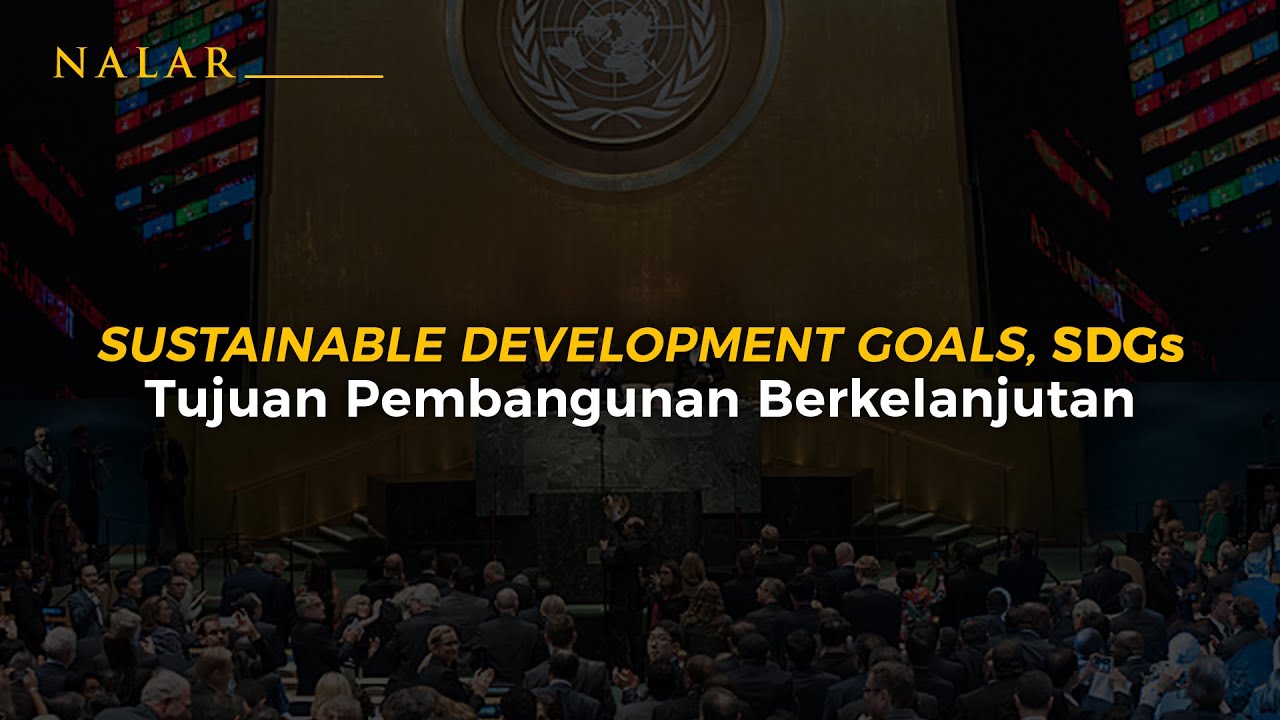NALAR Ep. 48. MENGIMPLEMENTASIKAN SDGs DI INDONESIA
Summary
TLDRThe video discusses the implementation of Sustainable Development Goals (SDGs) in Indonesia, contrasting them with Millennium Development Goals (MDGs). It highlights the SDGs' five fundamental dimensions: People, Planet, Prosperity, Peace, and Partnership, emphasizing a holistic, participatory approach to development. The challenges faced include the need for broader perspectives beyond government and improved coordination among stakeholders. The success of the SDGs hinges on selecting realistic priorities, developing quality indicators collaboratively, and ensuring effective resource mobilization. Ultimately, the aim is to protect citizens' rights while promoting inclusive growth and environmental sustainability.
Takeaways
- 😀 The SDGs were officially adopted by 193 UN member states, including Indonesia, during the 2015 UN General Assembly.
- 🌍 The SDGs consist of 17 goals and 169 targets aimed to be achieved by 2030, transitioning from the previous MDGs which had 8 goals and 60 targets.
- 🔄 The new framework replaces the 'Profit' pillar of MDGs with 'Prosperity', and introduces two additional dimensions: 'Peace' and 'Partnership'.
- 🔍 Key differences between SDGs and MDGs include a focus on impact, public participation, a holistic approach, and enhanced transparency and accountability.
- 🤝 Successful implementation of SDGs in Indonesia requires a clear vision, alignment with national priorities, and engagement of diverse stakeholders.
- 📊 There are 319 national indicators for SDGs in Indonesia, with 85 matching global standards, indicating a structured approach to monitoring progress.
- 🏛️ The implementation framework is governed by Presidential Regulation No. 59 of 2017, which outlines how SDGs are to be executed at various government levels.
- 🚧 Challenges in implementing SDGs stem from limited government perspectives, necessitating the involvement of non-governmental organizations and other sectors.
- 📈 Effective strategies for SDG implementation include contextualization of goals, development of quality indicators, resource mobilization, and rigorous measurement of outcomes.
- 👥 Ultimately, sustainable development prioritizes the rights of citizens, environmental protection, and the rule of law, emphasizing a balanced approach to growth.
Q & A
What are the key differences between the Millennium Development Goals (MDGs) and the Sustainable Development Goals (SDGs)?
-The MDGs had 8 goals and 60 targets, while the SDGs expanded this to 17 goals and 169 targets. SDGs also emphasize a more holistic approach with five dimensions: People, Planet, Prosperity, Peace, and Partnership, instead of the 3Ps of MDGs.
What are the five dimensions that support the Sustainable Development Goals?
-The five dimensions of SDGs are: People, Planet, Prosperity, Peace, and Partnership. These dimensions represent social, environmental, economic, and governance aspects of sustainable development.
How do the SDGs align with Indonesia's national development agenda, Nawacita?
-The SDGs are aligned with Nawacita by directly corresponding specific goals and targets of the SDGs with national priorities, thus ensuring that international commitments resonate with local development objectives.
What is the significance of stakeholder involvement in implementing SDGs in Indonesia?
-Stakeholder involvement is crucial for ensuring a comprehensive approach to development. Engaging various groups such as government, civil society, academia, and the private sector enriches perspectives and promotes collaborative solutions.
What are the three frameworks necessary for the implementation of SDGs?
-The three necessary frameworks for implementing SDGs are: 1) Regulatory and policy framework, 2) Governance and institutional arrangement framework, and 3) Accountability mechanism framework.
What challenges does Indonesia face in implementing the SDGs?
-Indonesia faces substantive challenges related to governmental perspectives on development and technical challenges in policy execution. Effective collaboration with non-governmental actors is vital for overcoming these obstacles.
Why is the contextualization of SDGs important for Indonesia?
-Contextualization is important because it allows Indonesia to prioritize and adapt SDGs to fit its unique needs and capabilities, ensuring that the goals are realistic and relevant to the national context.
How many indicators has Indonesia identified for tracking the SDGs, and what is their significance?
-Indonesia has identified 319 national indicators for tracking the SDGs. These indicators include 85 that align with global indicators and others that serve as proxies, which are essential for measuring progress and accountability.
What is meant by 'baseline data' in the context of SDGs implementation?
-Baseline data refers to the current state of development indicators before the implementation of SDGs. It serves as a reference point to measure future progress and achievements against set targets.
What core values underpin the concept of sustainable development as discussed in the transcript?
-The core values underpinning sustainable development include the protection of human rights, environmental sustainability, social equity, and the promotion of democratic governance, ensuring that development benefits all citizens.
Outlines

This section is available to paid users only. Please upgrade to access this part.
Upgrade NowMindmap

This section is available to paid users only. Please upgrade to access this part.
Upgrade NowKeywords

This section is available to paid users only. Please upgrade to access this part.
Upgrade NowHighlights

This section is available to paid users only. Please upgrade to access this part.
Upgrade NowTranscripts

This section is available to paid users only. Please upgrade to access this part.
Upgrade NowBrowse More Related Video

Episode 4: Origin Story of Sustainable Development Goals | Origin of SDGs | SDG Plus

NALAR Ep. 47 APA ITU SUSTAINABLE DEVELOPMENT GOALS (TUJUAN PEMBANGUNAN BERKELANJUTAN)?

Evaluation Snapshot: Millenium Development Goals

SDG sectorial universality : all fields are covered

The United Nations Sustainable Development Summit: 17 Goals to Transform Our World

أهداف التنمية المستدامة
5.0 / 5 (0 votes)